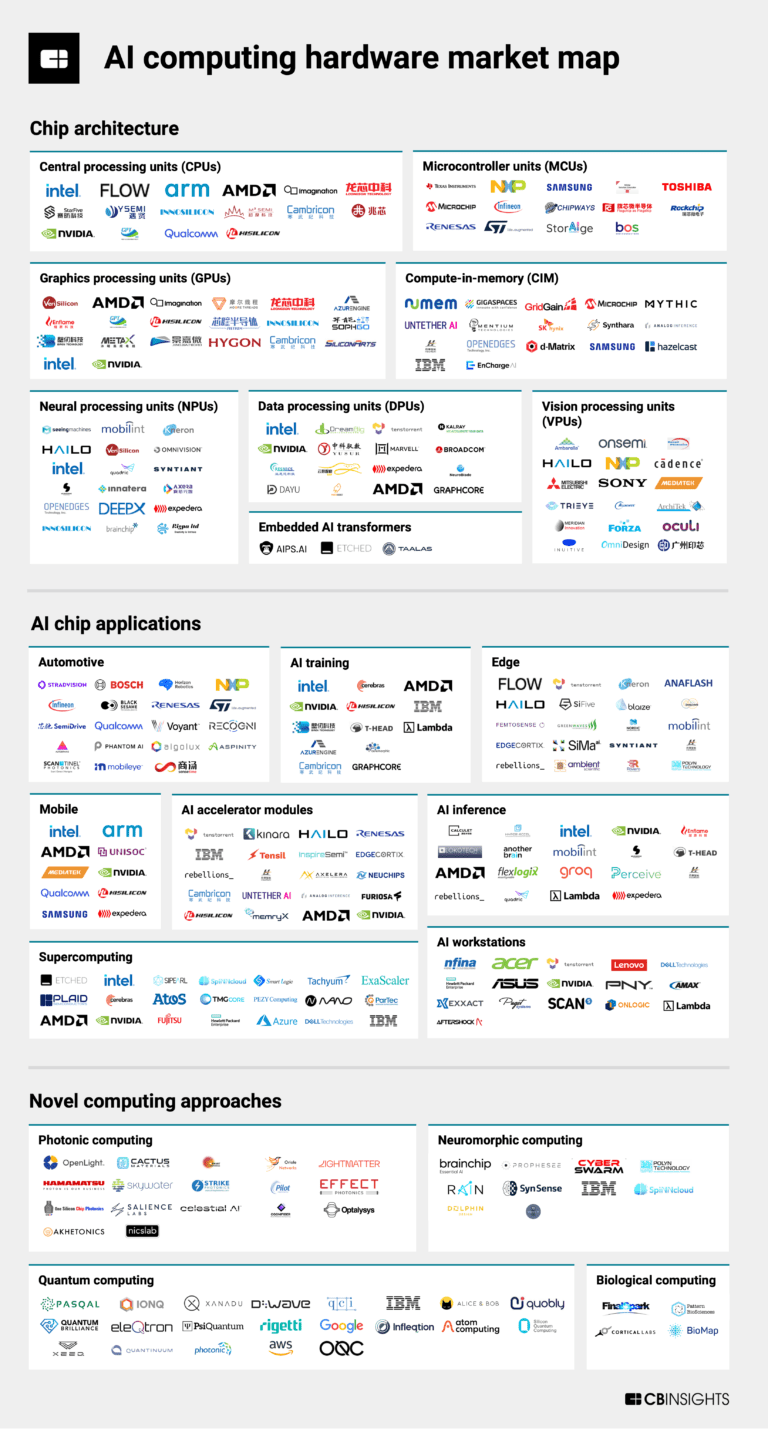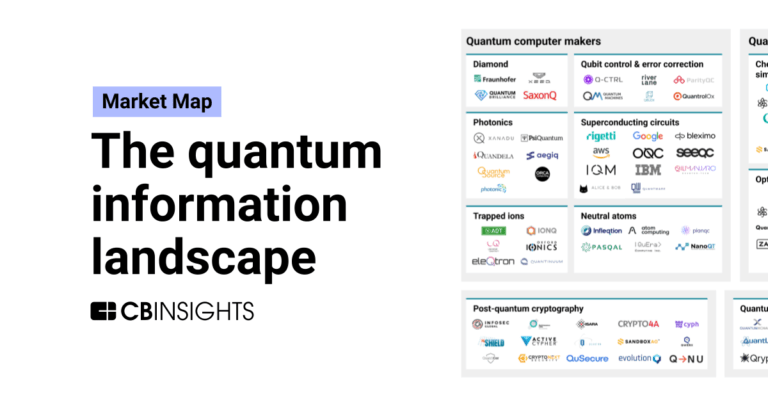
Xanadu
Founded Year
2016Stage
Acq - Pending | AliveTotal Raised
$267.81MValuation
$0000Mosaic Score The Mosaic Score is an algorithm that measures the overall financial health and market potential of private companies.
+49 points in the past 30 days
About Xanadu
Xanadu is a Canadian quantum technology company specializing in photonic quantum hardware. It develops quantum computers and quantum machine learning software, focusing on creating accessible and useful quantum computing solutions. Xanadu primarily serves the quantum research and development community. It was founded in 2016 and is based in Toronto, Canada.
Loading...
ESPs containing Xanadu
The ESP matrix leverages data and analyst insight to identify and rank leading companies in a given technology landscape.
The quantum computer makers — photonics market refers to companies that build quantum computers using photons (particles of light) as quantum bits (qubits) for quantum information processing. These providers develop full-stack photonic quantum computing systems that include quantum processors, control software, and networking components. Photonic quantum computers offer advantages including room-t…
Xanadu named as Leader among 12 other companies, including PsiQuantum, Quantum Computing, and Photonic.
Loading...
Research containing Xanadu
Get data-driven expert analysis from the CB Insights Intelligence Unit.
CB Insights Intelligence Analysts have mentioned Xanadu in 3 CB Insights research briefs, most recently on Sep 13, 2024.

Sep 13, 2024
The AI computing hardware market mapExpert Collections containing Xanadu
Expert Collections are analyst-curated lists that highlight the companies you need to know in the most important technology spaces.
Xanadu is included in 8 Expert Collections, including Quantum Tech.
Quantum Tech
628 items
This Expert Collection contains private and recently exited companies working on quantum computing, quantum communication, post-quantum cryptography, quantum sensors, and other quantum tech.
Unicorns- Billion Dollar Startups
1,309 items
Game Changers 2018
36 items
Our selected startups are high-momentum companies pioneering technology with the potential to transform society and economies for the better.
AI 100 (All Winners 2018-2025)
300 items
The winners of the 4th annual CB Insights AI 100.
Conference Exhibitors
5,302 items
Semiconductors, Chips, and Advanced Electronics
7,494 items
Companies in the semiconductors & HPC space, including integrated device manufacturers (IDMs), fabless firms, semiconductor production equipment manufacturers, electronic design automation (EDA), advanced semiconductor material companies, and more
Xanadu Patents
Xanadu has filed 46 patents.
The 3 most popular patent topics include:
- quantum mechanics
- quantum information science
- photonics

Application Date | Grant Date | Title | Related Topics | Status |
|---|---|---|---|---|
12/10/2020 | 4/1/2025 | Quantum information science, Quantum mechanics, Quantum computing, Quantum physicists, Artificial neural networks | Grant |
Application Date | 12/10/2020 |
|---|---|
Grant Date | 4/1/2025 |
Title | |
Related Topics | Quantum information science, Quantum mechanics, Quantum computing, Quantum physicists, Artificial neural networks |
Status | Grant |
Latest Xanadu News
Nov 12, 2025
After years of stalled execution and missed opportunities, Ottawa's latest budget feels less like another political exercise and more like a national reset. This is where Canadian tech innovation strategy begins to evolve from policy talk to actionable reform. With bold financial commitments and long-overdue regulatory modernization, the 2025 budget signals that the government is finally ready to take the tech economy seriously. But is the optimism warranted? Let's break it down. What Budget 2025 Canada Tech Really Means The government has promised more than $80 billion in tech-related spending , with $6.6 billion earmarked for the new Defence Industrial Strategy. It's the clearest signal yet that technology is now being treated as a matter of national sovereignty not just economic growth. Alongside defence, Ottawa is finally moving on long-delayed projects like open banking real-time payments , and stablecoin legislation . These are critical building blocks for Canada's fintech ecosystem and could open doors for a new generation of startups to compete globally. Yet, the challenge remains the same: execution. Budgets can tell inspiring stories, but without follow-through, they risk fading into the archives. Why the Mood Has Shifted in the Tech Community Compared to the frustration that followed last year's budget, this year's tone across Canada's startup ecosystem is cautiously upbeat. Founders, investors, and innovation advocates say the new approach feels collaborative The government has taken time to engage with the private sector, something missing in past innovation strategies. “They're listening now,” one Toronto-based fintech CEO told BetaKit . “That changes everything.” And there's data to support this renewed confidence: Angel investment rose 27% in 2024 , reaching $146.2 million , showing grassroots investor enthusiasm returning. Xanadu , Canada's quantum-computing pioneer, announced a $3.6 billion USD SPAC deal , marking a milestone for deep-tech capital markets. 1Password , one of Canada's most trusted cybersecurity brands, crossed $400 million USD in annual recurring revenue Each success feeds into a broader narrative: that the Canadian tech innovation strategy is finally getting traction — not through slogans, but through tangible wins. Canada's Three Strategic Tech Pillars 1. Defence and Digital Sovereignty The decision to invest heavily in defence technology isn't just about national security; it's about protecting intellectual property and reducing reliance on foreign suppliers. For Canadian startups in AI, quantum, or cybersecurity, this opens new lanes for partnership and procurement. 2. Modernizing Financial Infrastructure For years, open banking and real-time payments have been stuck in limbo. Budget 2025 Canada tech finally brings them to life. This could empower fintech startups, encourage healthy competition with traditional banks, and create a more transparent system for consumers. 3. Turning Strategy into Execution Perhaps the most significant shift is the recognition that execution, not vision, has been Canada's Achilles heel. The government is promising new accountability frameworks and performance metrics — something industry leaders have demanded for years. The Gaps That Still Need Filling Despite the positive direction, Budget 2025 leaves several questions unanswered. How quickly will new funding programs roll out? Who will be eligible? And how will success be measured? Execution risk remains high. Startups thrive on predictability, yet the fine print behind these programs often emerges months later. If the government can't deliver timelines and clear access criteria soon, confidence could wane again. Still, most insiders see progress. The difference this time, they say, is tone. There's a willingness to listen and to adapt. What Startups and Founders Should Do Now If you run a tech company in Canada, Budget 2025 Canada tech is a sign to prepare not wait. Here's how: Align your business story with national priorities like defence, fintech modernization, and AI adoption. Engage early with federal innovation programs and accelerators — many will open new application rounds in early 2026. Document your metrics revenue growth, IP creation, sustainability practices. Clear numbers will be vital when applying for support. Collaborate locally . Regional innovation hubs are expected to receive more funding. Partnerships can strengthen eligibility for government-backed projects. In other words, don't wait for the perfect program to drop. Position your company now to ride the wave when it does. Real-World Wins Reflect the Momentum Several Canadian tech firms are already embodying what the new innovation strategy looks like in practice: Beacon Software , a Toronto AI holding firm, raised $250 million USD to acquire smaller tech companies and embed AI into their operations. Questbank , Questrade's new banking arm, finally received its federal license after six years — proof that financial innovation can overcome red tape. Shopify and Lightspeed , two of Canada's biggest tech exports, continue to outperform revenue forecasts, proving that local success can translate globally. These aren't isolated events they form a pattern. Canada's digital economy is quietly but steadily maturing. The Long Game: Can Canada Lead Again? Here's the big question: will be remembered as the turning point for Canadian innovation? For years, Canada's innovation ecosystem has been called polite, modest — even risk-averse. This budget signals a move toward something bolder. It's a chance to build industries that don't just survive off U.S. capital but compete with it. The outlined here won't transform the economy overnight, but it lays a foundation for what's next: a more independent, data-driven, and ethically grounded tech sector. Execution will define everything. If the federal government can sustain its momentum, Canada could become a model for mid-sized economies looking to balance growth with sovereignty. Conclusion: A Story Still Being Written As BetaKit's Douglas Soltys wrote, “Budgets are always an exercise in storytelling.” This one tells a story of cautious confidence — a country trying to wean itself from dependency while building something lasting. The question isn't whether Canada can innovate; it's whether it can execute. And that story is still being written — in every startup pitch, funding round, and policy decision that follows. Stay ahead of the curve with BestStartup Canada ,your go-to source for the latest innovations, emerging tech companies, and industry trends shaping the future of Canadian startups. FAQs 1.What is Budget 2025 Canada tech? It's the federal budget's roadmap for technology and innovation investments, focusing on defence, fintech, and AI-driven sectors. 2.How does it affect startups? It creates funding opportunities, tax incentives, and infrastructure improvements that could boost early-stage growth. 3.Why is the Canadian tech innovation strategy important? It's crucial for long-term competitiveness, reducing U.S. dependency, and building domestic talent pipelines. 4.What challenges remain? Execution and communication — without clear follow-through, even great policy ideas risk losing momentum. 5.What's next for Canadian tech? A shift toward deeper collaboration between public institutions, venture capital, and emerging tech sectors like quantum and AI.
Xanadu Frequently Asked Questions (FAQ)
When was Xanadu founded?
Xanadu was founded in 2016.
Where is Xanadu's headquarters?
Xanadu's headquarters is located at 10 Dundas Street East, Toronto.
What is Xanadu's latest funding round?
Xanadu's latest funding round is Acq - Pending.
How much did Xanadu raise?
Xanadu raised a total of $267.81M.
Who are the investors of Xanadu?
Investors of Xanadu include Crane Harbor Acquisition, Department of National Defence, Quantum Benchmarking Initiative, National Research Council of Canada Industrial Research Assistance, Innovate UK and 32 more.
Who are Xanadu's competitors?
Competitors of Xanadu include Pasqal, PsiQuantum, Photonic, QuiX Quantum, Akhetonics and 7 more.
Loading...
Compare Xanadu to Competitors

PsiQuantum is a quantum computing company focused on building commercially viable silicon photonic quantum computer. The company offers design and construction of utility-scale quantum computers utilizing a photonics-based architecture. It also engages in research and development of applications for quantum computing that address problems in various sectors. PsiQuantum was formerly known as PsiQ. It was founded in 2015 and is based in Palo Alto, California.

Quandela operates in the quantum technology sector. Its offerings include quantum processors, simulators, algorithms, and consulting services. Quandela's products support the development and implementation of quantum computing algorithms and protocols. It was founded in 2017 and is based in Massy, France.
Polaris Electro-Optics focuses on integrated photonics for the communications and computation sectors. The company provides photonics products for data transmission in applications including data centers, cloud computing, artificial intelligence, high-performance computing, and quantum computing. It was founded in 2021 and is based in Broomfield, Colorado.

ORCA Computing specializes in the development of full-stack photonic quantum computers, focusing on the technology sector and quantum computing industry. The company offers modular, fiber-interconnected quantum computing systems designed to enhance performance, scalability, and usability for applications such as machine learning and optimization. ORCA primarily serves government and enterprise clients, guiding them from the discovery to deployment of quantum applications. It was founded in 2019 and is based in London, United Kingdom.

Q.ANT offers industrial quantum technology and photonics solutions within the computing and sensor technology sectors. It offers products that utilize quantum mechanics and photonic principles for computational and sensing applications. It addresses the needs of sectors that require advanced data processing and signal analysis. It was founded in 2018 and is based in Stuttgart, Germany.

Aegiq specializes in quantum computing and quantum networking within the technology sector. The company offers a range of products, including compact photonic quantum computers, quantum network interconnects, and quantum cryptographic communications, all utilizing integrated photonics for practical quantum applications. It primarily serves sectors such as telecommunications, defense and aerospace, financial, and advanced manufacturing. The company was founded in 2019 and is based in Sheffield, United Kingdom.
Loading...

